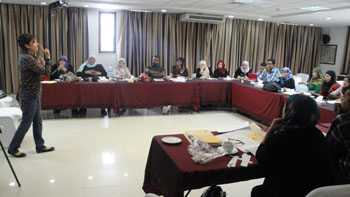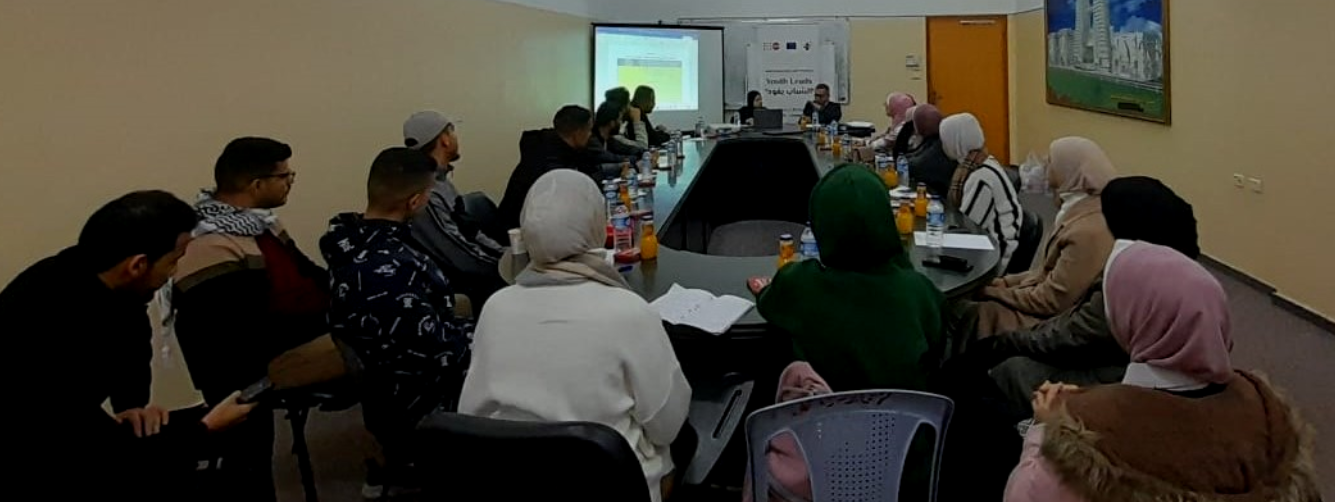
Ramallah – Muna Abu Obeidi and Randa Sbeitan are two women activists from the Jordan Valley who took part in a training course organized by MIFTAH in which 22 activists participated. The four-day training was entitled: “Health and reproductive rights” and was part of the Gender Equity and Protection program.
Muna is a member of the Women’s Activities Association in the Aqbat Jaber camp and a member of the Jericho and Jordan Valley organizations’ coalition. Randa, meanwhile is a women’s activist in the Sanabel Al Reef group in Jiftlik and also a member of the coalition.
For these women, reproductive health was new territory. Randa was even hesitant to participate, but said once the training started, she realized these were important subjects which she knew close to nothing about. “I used to think that reproductive health was only about women,” she said. “Now I know that it is about women and men and this prompted me to discuss the subject with other women.“ She says she explained to them that reproductive health is not just about pregnancy and childbirth but also about female-related diseases and about raising men’s awareness on all of these topics.
Muna also admits she was ignorant about reproductive health and rights, saying she passed on what she learned in the training to other women in her vicinity. She is not done, though, maintaining that she would like to learn all there is on the subject and get answers to her questions on the material she learned during the training.
Executive director of the health work committees who also gave part of the training, Shatha Odeh, said the participants were from both sexes and from different age groups. She said it was extremely important to involve the male participants in the discussions on women’s issues and also on those pertaining to men. “We wanted to drive the point home that the participants have rights regardless of whether those rights are violated or not, in addition to being aware of the state or the Palestinian authoritys role in prevent these violations,” Odeh maintained. She also said it was apparent how little the participants knew about reproductive health and rights, including the right to make their own decisions about their lives. “We linked between protecting women from violence and sexual violations against them” Odeh explained. “Everyone realized the importance of being educated on reproductive rights and the need to address men since they are the main influence in many women’s lives.”
Hanan Abu Ghosh, director of the women’s health program in the health work committees reaffirmed the importance of such training in terms of offering information and involving men on the subject, maintaining that one cannot speak about women’s rights and promoting their role and status in isolation of men and involving them in the transformation process. “We do not want to create a gap in the knowledge and approaches of the two sides,” she said, explaining one reason for men’s involvement. Abu Ghosh also concluded that the participants would greatly benefit from further and more extensive training to enable them to train others.
Ma’an Ideis from the Independent Commission for Human Rights(ICHR) also took part in the training, giving a presentation on reproductive health violations and the role of the ICHR in blowing the whistle on these violations to the official party responsible for them. He urged the participants – individuals and organizations – to inform the ICHR on any violation that may occur so they could address and put a stop to it.
MIFTAH coordinator Hanan Saeed said "participants in the training - -which was part of the Gender Equity and Protection program funded by UNFPA – are members of the UN Resolution 1325 Coalition in Jericho and the Jordan Valley". She said "the goal of the training was to conclude with certain issues in the field of reproductive health as adopted by the member-organizations in the coalition, which are part of its plans and programs. The following topics were specified: sexually-transmitted diseases, early marriage and malignant diseases such as breast and cervical cancer. The participants were informed of the most prominent institutions and centers that deal with these diseases".
The training addressed several topics over the course of four days, including: international conventions on health and reproductive rights; The Convention on the Elimination of All Forms of Discrimination against Women; the concept of reproductive health and its relationship with gender-based violence; the importance of including men in health issues; early detection of cervical and breast cancer and prostate cancer, in addition to methods for building social networks to protect women and introducing the participants to the institutions and centers that offer support and protection for women.







